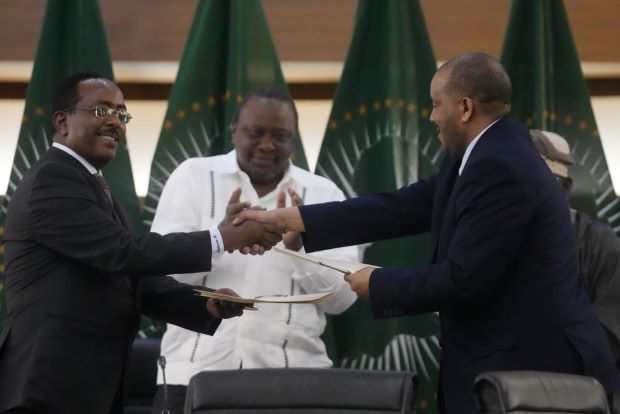Ethiopia warring parties agree to truce deal

By Zama Luthuli
PRETORIA – The warring sides in Ethiopia’s devastating conflict have agreed on a truce, the African Union’s (AU) mediator announced on Wednesday (2) following marathon talks in South Africa.
The surprise deal was unveiled almost two years to the day since the start of a war that has claimed many thousands of lives and unleashed a desperate humanitarian crisis.
“Today is the beginning of a new dawn for Ethiopia, for the Horn of Africa and indeed for Africa as a whole,” the AU’s broker, former Nigerian president Olusegun Obasanjo, declared.
“The two parties in the Ethiopian conflict have formally agreed to the cessation of hostilities as well as the systematic, orderly, smooth and coordinated disarmament,” Obasanjo said at a briefing in Pretoria.
They also agreed on “restoration of law and order, restoration of services, unhindered access to humanitarian supplies, protection of civilians… among other areas of agreement.”
But, cautioned, “this moment is not the end of the peace process but the beginning of it. Implementation of the peace agreements signed today is critical.”
Diplomatic efforts to bring the government of Prime Minister Abiy Ahmed and the rebels to the negotiating table gathered pace after combat resumed in late August, torpedoing a five-month truce that had allowed limited amounts of aid into war-stricken Tigray.
The negotiations began in Pretoria on Tuesday (Oct 25) and were scheduled to run until Sunday (Oct 30) but were extended.
They were the first formal dialogue between the Ethiopian government and the Tigray People’s Liberation Front (TPLF) since the conflict began.
Secret contacts were held previously in Seychelles and Djibouti, according to a Western official.
Tigray’s rebels hailed the deal and said they had made “concessions.”
“We are ready to implement and expedite this agreement,” said the head of their delegation, Getachew Reda.
“In order to address the pains of our people, we have made concessions because we have to build trust.”
Despite the peace process, intense fighting had continued unabated in Tigray, where government troops backed by the Eritrean army and regional forces were waging artillery bombardments and air strikes, capturing a string of towns from the rebels.
These included the strategic city of Shire as well as Axum and Adwa, according to Abiy.
The international community had voiced deep alarm over the combat and the toll among civilians caught in the crossfire.
As well as a ceasefire and humanitarian access to Tigray, Western governments had also called for a withdrawal of Eritrean forces, whose return to the battleground has raised fears of renewed atrocities against civilians.
The conflict erupted on November 4, 2020, when Abiy sent troops into Tigray after accusing the TPLF, the regional ruling party, of attacking federal army camps.
The fighting followed months of seething tensions between Abiy and the TPLF, which had dominated the ruling coalition in Ethiopia for almost three decades before he came to power in 2018.
The war has forced well over two million people from their homes, and according to US estimates, killed as many as half a million.
“All parties have been responsible for serious violations, encompassing war crimes and crimes against humanity, including extrajudicial executions and summary killings of hundreds of people and sexual violence against women and girls,” Amnesty International said in a statement Wednesday ahead of the two-year anniversary.
-Agence France-Presse


Comments are closed, but trackbacks and pingbacks are open.